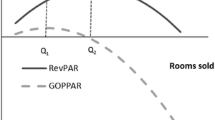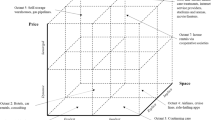Abstract
This research note addresses the overtourism phenomenon from a revenue management perspective. The paper claims that overtourism is an indication of a revenue management failure, on both destination and corporate levels, because the demand surpasses the capacity of the destination. Overtourism provides destinations and tourist companies with opportunities to replace extensive growth (more tourists) with intensive growth (higher prices) in order to match demand and supply. Various pricing, non-pricing and combined revenue management techniques can be used utilised for this.


Similar content being viewed by others
References
Burrai, E., D.M. Buda, and D. Stanford. 2019. Rethinking the ideology of responsible tourism. Journal of Sustainable Tourism. https://doi.org/10.1080/09669582.2019.1578365.
Canadfdadfdf, E. 2019. Responses to overtourism in Guanacaste (Costa Rica): A rural water conflict perspective. In Overtourism. Issues, realities and solutions, ed. R. Dodds and R.W. Butler, 107–125. Berlin: DeGruyter.
Chapuis, J.M. 2013. A cross-cultural analysis of passenger’s reactions to revenue and pricing management. Journal of Revenue and Pricing Management 12 (1): 16–25.
Christodoulidou, N., D.J. Connolly, and P. Brewer. 2009. Travel meta-search: Opportunity or threat? Tourism Analysis 14 (6): 821–832.
Coldwell, W. 2017. First Venice and Barcelona: Now anti-tourism marches spread across Europe. https://www.theguardian.com/travel/2017/aug/10/anti-tourism-marches-spread-across-europe-venice-barcelona. Accessed 27 Apr 2019.
Cruz, R.G., and G.F.A. Legaspi. 2019. Boracay beach closure: the role of the government and the private sector. In Overtourism. Issues, realities and solutions, ed. R. Dodds and R.W. Butler, 95–111. Berlin: DeGruyter.
Dacko, S.G. 2004. Marketing strategies for last-minute travel and tourism: Profitability and revenue management implications. Journal of Travel & Tourism Marketing 16 (4): 7–20.
Dalir, S., A. Mahamadaminov, and H.G. Olya. 2020. Airbnb and taxation: Developing a seasonal tax system. Tourism Economics. https://doi.org/10.1177/1354816620904894.
Dickinson, G. 2018a. Dear dictionaries, this is why 'overtourism' should be your 2018 word of the yearhttps://www.telegraph.co.uk/travel/comment/overtourism-word-of-the-year/. Accessed 27 Apr 2019.
Dickinson, G. 2018b. ‘Overtourism’ shortlisted as Word of the Year following Telegraph Travel campaign. https://www.telegraph.co.uk/travel/news/overtourism-word-of-the-year-oxford/. Accessed 27 Apr 2019.
Dodds, R., and R. Butler (eds.). 2019. Overtourism: Issues, realities and solutions. Berlin: De Gruyter.
Favre, C. 2017. The Small2Mighty tourism academy: Growing business to grow women as a transformative strategy for emerging destinations. Worldwide Hospitality and Tourism Themes 9 (5): 555–563.
Forgacs, G. 2017. Revenue management: Maximizing revenue in hospitality operations, 2nd ed. Lansing, MI: American Hotel & Lodging Educational Institute.
Gonzalez, V.M., L. Coromina, and N. Gali. 2018. Overtourism residents’ perceptions of tourism impact as an indicator of resident social carrying capacity—Case study of a Spanish heritage town. Tourism Review 73 (3): 227–296.
Hayes, D.K., and A.A. Miller. 2011. Revenue management for the hospitality industry. Hoboken, N. J.: John Wiley and Sons.
Hess, J.S. 2019. Thailand: Too popular for its own good. In Overtourism. Issues, realities and solutions, ed. R. Dodds and R.W. Butler, 11–125. Berlin: DeGruyter.
Ivanov, S. 2014. Hotel revenue management: From theory to practice. Varna: Zangador.
Ivanov, S., and V. Zhechev. 2012. Hotel revenue management—A critical literature review. Tourism 60 (2): 175–197.
Jamieson, W. 2019. Overtourism management competencies in Asian urban heritage areas. International Journal of Tourism Cities. https://doi.org/10.1108/IJTC-08-2019-0143.
Kepher-Goma, J. 2019. Tourism in Africa: Is overtourism evident? In Overtourism. Issues, realities and solutions, ed. R. Dodds and R.W. Butler, 148–151. Berlin: DeGruyter.
Kimes, S.E. 1989. Yield management: A tool for capacity-constrained service firms. Journal of Operations Management 8 (4): 348–363.
Koens, K., A. Postma, and B. Papp. 2018. Is overtourism overused? Understanding the impact of tourism in a city context. Sustainability 10 (12): 1–15.
Leadbeater, C. 2017. Anti-tourism protesters in Barcelona slash tyres on sightseeing buses and rental bikes. https://www.telegraph.co.uk/travel/news/bus-attack-in-barcelona-adds-to-fears-as-tourism-protests-grow/. Accessed 27 Apr 2019.
Legoherel, P., E. Poutier, and A. Fyall (eds.). 2013. Revenue management for hospitality and tourism. Woodeaton: Goodfellow Publishers ltd.
Mangion, M.L., R. Durbarry, and M.T. Sinclair. 2005. Tourism competitiveness: Price and quality. Tourism Economics 11 (1): 45–68.
Marcus, L. 2018. Taj Mahal increases ticket prices. https://edition.cnn.com/travel/article/taj-mahal-ticket-price-increase/index.html. Accessed 28 Apr 2019.
Mauri, A.G. 2012. Hotel revenue management: Principles and practices. Milan-Torino: Pearson Italia.
Milano, C., J.M. Cheer, and M. Novelli (eds.). 2019. Overtourism. Excesses, discontents and measures in travel and tourism. Wallingford: CABI.
Milano, C. 2017. Overtourism and tourismphobia; Global trends and local context. Barcelona: Ostelea School of Tourism & Hospitality.
Morrison, A.M. 2019. Marketing and managing tourism destinations, 2nd ed. Oxon: Routledge.
Namberger, P., J. Sascha, S. Jurgen, and K. Marion. 2019. Overcrowding, overtourism and local level disturbance: How much can Munich handle? Tourism Planning & Development 16 (4): 452–472.
Navarro-Ruiz, S., A. Casado-Díaz, and J. Ivars-Baidal. 2019. Cruise tourism: the role of shore excursions in the overcrowding of cities. International Journal of Tourism Cities. https://doi.org/10.1108/IJTC-04-2018-0029.
Ng, I.C.L. 2009. The pricing and revenue management of services: A strategic approach. London: Routledge.
Nicolau, J.L., and L. Masiero. 2013. Relationship between price sensitivity and expenditures in the choice of tourism activities at the destination. Tourism Economics 19 (1): 101–114.
Oklevik, O., S. Gossling, C.M. Hall, S.J.J. Kristian, G.I. Petter, and S. McCabe. 2019. Overtourism, optimisation, and destination performance indicators: A case study of activities in Fjord Norway. Journal of Sustainable Tourism. https://doi.org/10.1080/09669582.2018.1533020.
Panayiotopoulos, A., and C. Pisano. 2019. Overtourism dystopias and socialist utopias: Towards an urban armature for Dubrovnik. Tourism Planning & Development. https://doi.org/10.1080/21568316.2019.1569123.
Paris, N. 2017. Tourists have turned Oxford into ‘hell’ local claim. https://www.telegraph.co.uk/travel/news/oxford-tourist-hell-overcrowding-residents-locals-complain/. Accessed 27 Apr 2019.
Pinke-Sziva, I., M. Smith, G. Olt, and Z. Berezvai. 2019. Overtourism and the night-time economy: A case study of Budapest. International Journal of Tourism Cities 5 (1): 1–16.
Plichta, J. 2019. The co-management and stakeholders theory as a useful approach to manage the problem of overtourism in historical cities—Illustrated with an example of Krakow. International Journal of Tourism Cities. https://doi.org/10.1108/IJTC-12-2018-0107.
Sanchez, P.M., and K.M. Adams. 2008. The Janus-faced character of tourism in Cuba. Annals of Tourism Research 35 (1): 27–46.
Seraphin, H., V. Gowreesunkar, M. Zaman, and T. Lorey. 2019. Limitations of Trexit (tourism exit) as a solution to overtourism. Worldwide Hospitality and Tourism Themes 11 (5): 566–581.
Seraphin, H., V. Gowreesunkar, M. Zaman, and S. Bourliataux. 2019. Community Based Festivals as a tool to tackle tourismphobia and antitourism movements. Journal of Hospitality and Tourism Management. https://doi.org/10.1016/j.jhtm.2018.12.001.
Seraphin, H., M. Zaman, S. Olver, S. Bourliataux, and S. Dosquet. 2019. Destination branding and overtourism. Journal of Hospitality and Tourism Management. https://doi.org/10.1016/j.jhtm.2018.12.001.
Séraphin, H., P. Sheeran, and M. Pilato. 2018. Over-tourism and the fall of Venice as a destination. Journal of Destination Marketing & Management 9: 374–376.
Singh, T. 2018. Is over-tourism the downside of mass tourism? Tourism Recreation Research 43 (4): 415–416.
Smith, M.K., I.P. Sziva, and G. Olt. 2019. Overtourism and resident resistance in Budapest. Tourism Planning & Development 16 (4): 376–392.
Smith, O. 2018. Is Greece on the brink of an overtourism crisis? https://www.telegraph.co.uk/travel/destinations/europe/greece/articles/greece-overtourism-santorini/. Accessed 27 Apr 2019.
Talluri, K.T., and G. van Ryzin. 2005. The theory and practice of revenue management. New York: Springer Science+Business Media.
Visser, W. 2015. Sustainable frontiers. Unlocking change through business, leadership and innovation. Sheffield: Greenleaf Publishing.
Vives, A., M. Jacob, and E. Aguiló. 2018. Online hotel demand model and own-price elasticities: An empirical application in a mature resort destination. Tourism Economics. https://doi.org/10.1177/1354816618800643.
Weeden, C. 2015. Legitimization through corporate philanthropy: A cruise case study. Tourism in Marine Environments 10 (3–4): 201–210.
Yeoman, I., and U. McMahon-Beattie (eds.). 2011. Revenue management. A practical pricing perspective. Basingstoke: Palgrave Macmillan.
Yeoman, I., and U. McMahon-Beattie (eds.). 2004. Revenue management and pricing: Case studies and applications. London: Thomson Business Press.
Author information
Authors and Affiliations
Corresponding author
Additional information
Publisher's Note
Springer Nature remains neutral with regard to jurisdictional claims in published maps and institutional affiliations.
Rights and permissions
About this article
Cite this article
Seraphin, H., Ivanov, S. Overtourism: a revenue management perspective. J Revenue Pricing Manag 19, 146–150 (2020). https://doi.org/10.1057/s41272-020-00241-7
Received:
Accepted:
Published:
Issue Date:
DOI: https://doi.org/10.1057/s41272-020-00241-7




